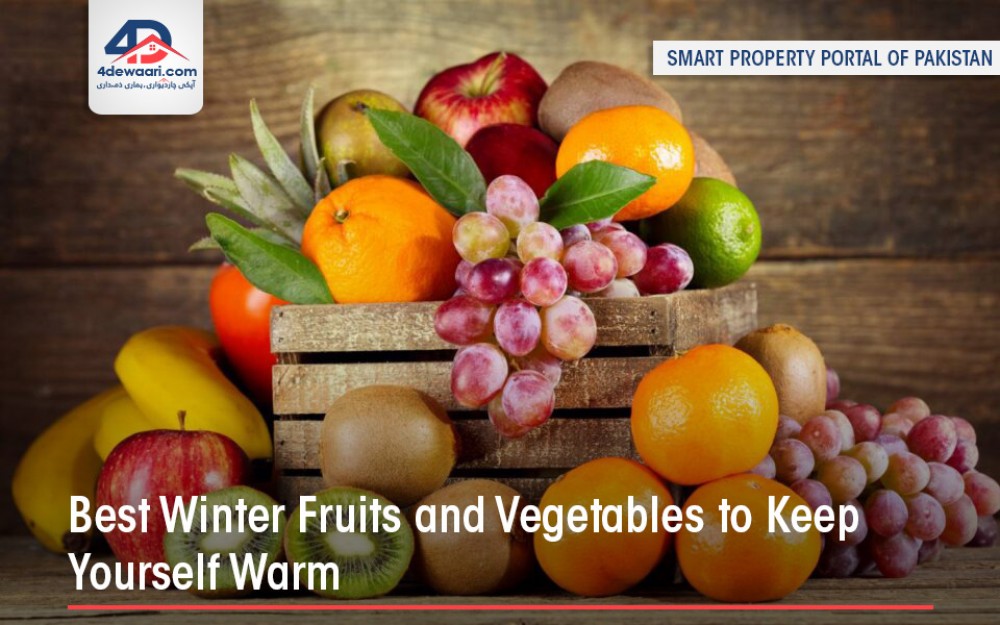Fruits And Vegetables To Use In Winter Season
Winter is around the sparkly snowflakes and the bone-chilling coldness outside necessitates to equip yourself not only with thick cloths but also with warm eatables like warm fruits, vegetables, and Most Popular Winter Season Hot Drinks like tea, etc. They don’t usually grow in colder climates, finding locally grown veggies and fruits to nourish you in winter can be downright challenging but it requires you to search for them because some of them are in our close vicinity. So in order for your food not to revolve around potatoes and onions only, we have put together for you some of the best winter fruits and vegetables in this blog.
Here are some of the unexpected, vitamin-rich, Winter Fruits And Vegetables, you should stock up on just before winter and enjoy the winter season to the fullest:
Cabbage
While some strains of cabbage are available all year round, mostly appear in cool weather and are ready for harvest through the fall and winter. When it comes to storing them, tightly wrap individual heads of cabbage in plastic, and stash them in the refrigerator to keep them fresh for up to a week. In terms of its usage, cabbage’s nutritional benefits are most pronounced when raw, so slice up a few leaves to add crunch to salads, stir-fries, and Cabbage Soup. Moreover, this super-healthy, budget-friendly vegetable is a close cousin of other favorites from chilly climes, like Cauliflower, Brussels Sprouts, Kale, and Broccoli.
Talk of nutritional value, it provides plenty of vitamins and minerals, including cameos from vitamins C and K, as well as folate, fiber, antioxidants, and anti-carcinogenic compounds called glucosinolates.
Brussels Sprouts
The peak season of Brussels Sprouts is from September through February. About storage, don’t you worry they will stay fresh in the fridge for a few weeks? The outer leaves will shrivel, so remove them just before cooking your sprouts. When it comes to usage, toss halved sprouts with olive oil and roast until crispy and brown. Top with a light coating of brown butter and sage for a decadent (but still healthy) side dish and here you are with a yummy one.
Nutrition-wise, brussels sprout, aka cabbage’s mini-me, boasts some of the same health benefits as that of cabbage. Not only that but also like other cruciferous veggies, brussels sprouts have high levels of cancer-fighting antioxidants that may protect DNA from harmful compounds in the body.
Winter Squash
The peak season of Winter Squash is around late September to early March. Even though they seem pretty solid, squash continues to ripen after picking. The ripening is slowed down by storing them in a slightly humid environment (like a basement or cellar). Under the right conditions, squash will keep for up to 3 months. When it comes to its making, since squash is healthy, fairly inexpensive, filling, and super darn tasty, it’s no wonder that there are thousands of awesome recipes for them. Get started with these five delicious dishes i.e. acorn, butternut, kabocha, and delicate. These all are at their prime during the fall and winter. Nutrition-wise, squash’s trendy golden flesh is teeming with nutrients, including carotenoids, Vitamin A, and potassium.
Potatoes
Needless about it because it is quite known to us. The various varieties of Potatoes are available year-round. Store potatoes in a dark, cool, well-ventilated area for about 1 month. Keep spuds away from onions and apples because they do not get along. At room temperature, potatoes will keep for 1 to 2 weeks. When it comes to usage, there is a long-range of ways to work potatoes into a meal. Nutrition-wise, Potatoes are starchy and high on the glycemic index. They are also filling, inexpensive, and boast an impressive nutritional profile that includes potassium, magnesium, folic acid, vitamin C, and protein.
Additionally, purple taters may even help people bring down blood pressure and boost antioxidants. Nutrition-wise, sweet potatoes may be a healthier choice, with their treasure trove of beta-carotene, vitamins A and C, and fiber, regular white spuds are still a wholesome option, depending on the cooking method of choice.
See Also: How To Save Yourself From Winter Smog?
Onions
Various Types Of Onions are available all year. They should be stashed outside the fridge, as they can go soft in the refrigerator. They will keep in a cool, dry place for several months. It is got versatility, ideal for flavoring anything from soup, to grain salads, to pasta, to meat, onions are a year-round kitchen all-star. Even though they might make you cry while cutting, but onions are actually pretty healthy.
Nutrition-wise, these unassuming veggies are low in calories but provide surprising amounts of vitamin C and fiber.
Beets
You can have beets from early spring through late fall. Beets are best to store in a plastic bag in the refrigerator for up to a month. For a hearty, healthy veggie main, toss roasted beets and carrots with lentils and plenty of fresh herbs and spices. Sweet, earthy, and deep red, beets are pretty unique in the vegetable aisle. Nutrition-wise, beets contain antioxidants called betalains, which can help fight cancer and other degenerative diseases. Also, they are rich in vitamins A, B, and C, as well as potassium and folate. Different Types of Beets are a natural source of sugar as well.
Furthermore, they have naturally occurring dietary nitrates which increase nitric oxide which improves blood flow, lower blood pressure, increases exercise performance, and improve cognitive functioning.
Carrots
Carrots appear in the market in late fall, although some varieties become ready for harvesting during the winter. Like many Root Vegetables, carrots can be kept in a plastic bag in the refrigerator for several weeks. Usage-wise, bring out their natural sweetness with a side dish that combines the Orange Veggies, cinnamon, orange juice, and Maple Syrup.
Carrots carry vitamin A that is good for the immune system and the orange veggies also contain vitamin C and lutein, antioxidants that can help you keep disease the heck away.
Lastly, we would recommend you to keep good care of your food and House also, take serious Precautions To Keep Your House Dengue Free In Winter along with staying warm with wearable. Eat warm and stay warm!















